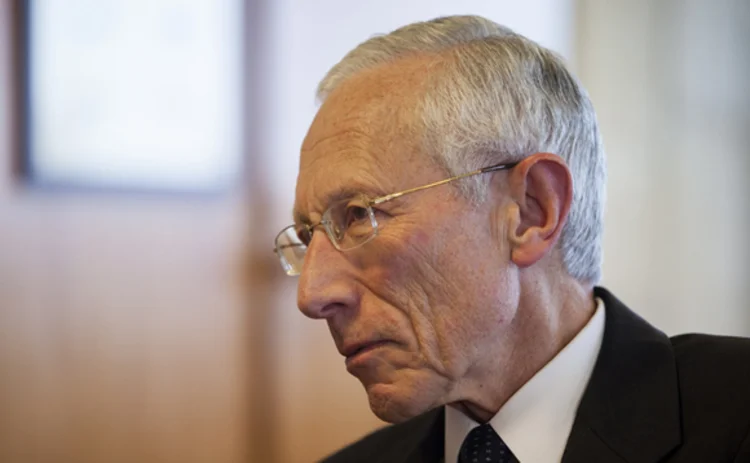
Fischer gives high marks to Bernanke and Draghi

The outgoing governor of the Bank of Israel and former Killian professor and head of the department of economics at the Massachusetts Institute of Technology (MIT), Stanley Fischer, has given high praise to two of his former students that now run the world's most powerful central banks.
"They've both done extremely well," said Fischer in a wide-ranging interview for Central Banking journal, published today, when asked about the performance of his doctorate student, Ben Bernanke, chairman of the Federal Reserve, and MIT student, Mario Draghi, president of the European Central Bank (ECB).
The actions taken by both Bernanke and Draghi have attracted plenty of criticism from economists and financial experts from diverse sections of society. But Fischer, a former first deputy managing director of the International Monetary Fund (IMF), said the actions taken by both men have helped the world economy to avoid greater calamity.
"Many of us in policy positions thought in October and November 2008 that the world could be heading for a repeat of the Great Depression," said Fischer. "We didn't get close to that – it was the worst post-World War II recession, and it felt and still feels awful, but neither the US nor Europe as a whole has got to the 25% unemployment rate that the US suffered in 1933."
Fischer notably praised Bernanke, who was chairman of the Fed at the beginning of the crisis. "The world owes him a lot," he said.
Many of us in policy positions thought in October and November 2008 that the world could be heading for a repeat of the Great Depression
The former World Bank chief economist was also sanguine about quantitative easing deployed by the Fed in the United States. Fischer said if he had a choice between a rebounding economy causing appreciation pressure on the shekel or a weakened US economy and a stable exchange rate, he would take the more rapidly appreciating US economy and deal with the exchange rate problems. Fischer said he believed Bernanke's description of ‘enrich-thy-neighbour' rather than 'beggar-thy-neighbour' actions by the Fed were accurate. "It may be Panglossian, but it happens in this case to be true."
High marks for Draghi
Fischer also said Draghi had made a critical contribution in Europe since he took on the role as head of the ECB in November 2011. "After Mario Draghi became president of the ECB, he changed the future of the European Monetary Union – of the euro – with one sentence. His job demands both economic and political skills, and he has both of them in ample supply," he added.
"Both Ben and Mario continue to get very high marks, and deserve our thanks," he said.
Asked if he was surprised that MIT alumni now run some of the most important central banks in the world, Fischer said he was not. "The MIT department of economics has for many years been rated as either the best or one of the best three economics departments, and for that reason tended to attract very good students," said Fischer. "So it is not surprising that many of our graduates have done well."
Fischer said Bernanke came to MIT with "an exceptionally strong undergraduate record from Harvard" and "he was outstanding at MIT as well". "So was Mario Draghi," he added.
The former IMF deputy head said there was a "very lively interest in policy at MIT". "My friend, colleague and co-author, Rudi Dornbusch, was a wonderful economist and a superb supervisor. He started out as a theorist and then moved over to policy. The older generation at MIT, the great MIT generation that included Paul Samuelson, Bob Solow and Franco Modigliani, were interested in and very good at policy. Rudi gradually developed this interest, and I had this interest, and many of our students sooner or later succumbed to that bug."
Fischer also discussed the changes he has made at the Bank of Israel during the past six years, the strengths of a flexible inflation-targeting regime, the Bank of Israel's macro-prudential and currency interventions, as well as its pursuit of financial stability and government policy. The Bank of Israel chief also gave his views on the development of multilateral rules to manage monetary policy and currency intervention, global regulations and the role of systemically important banks.
Only users who have a paid subscription or are part of a corporate subscription are able to print or copy content.
To access these options, along with all other subscription benefits, please contact info@centralbanking.com or view our subscription options here: http://subscriptions.centralbanking.com/subscribe
You are currently unable to print this content. Please contact info@centralbanking.com to find out more.
You are currently unable to copy this content. Please contact info@centralbanking.com to find out more.
Copyright Infopro Digital Limited. All rights reserved.
As outlined in our terms and conditions, https://www.infopro-digital.com/terms-and-conditions/subscriptions/ (point 2.4), printing is limited to a single copy.
If you would like to purchase additional rights please email info@centralbanking.com
Copyright Infopro Digital Limited. All rights reserved.
You may share this content using our article tools. As outlined in our terms and conditions, https://www.infopro-digital.com/terms-and-conditions/subscriptions/ (clause 2.4), an Authorised User may only make one copy of the materials for their own personal use. You must also comply with the restrictions in clause 2.5.
If you would like to purchase additional rights please email info@centralbanking.com








